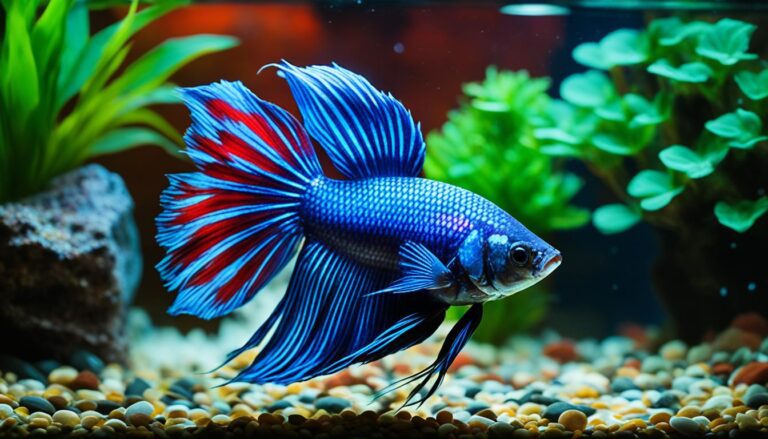Hello fellow aquarists and betta enthusiasts! Have you ever watched your betta fish and wondered if they sleep? The simple answer is yes, betta fish do sleep. They rest just like us, but in their own unique way. It’s key to know about betta fish sleeping habits for their health. Despite what some think, betta fish need their rest. Their sleep aligns with our day and night cycles.
Betta fish are light sleepers, a trait from their wild ancestors who avoided predators. At home, they still stay alert while resting. They can’t close their eyes, but they do have times of rest. Their sleep is best when day changes to night softly. This helps them maintain a regular, healthy sleep routine.
Some say bettas seem ‘lazy,’ possibly due to their need for more rest. Their ornate fins might need this. A tank with 10-14 hours of light helps them establish a healthy sleep cycle. This keeps them lively during their waking hours. With a life of 2-5 years, or even up to 9, their habitat is crucial for their health. If your betta sleeps too much, it might be time to check their health and tank conditions.
A tropical temperature of 78-82F (25-28C) is vital for your betta’s energy. They do best in warm water like their native Southeast Asian habitat. A good diet and clean water are also crucial for their rest and health. Knowing bettas need their sleep, let’s ensure they have the right conditions for it!
Unveiling the Mystery: Do Betta Fish Sleep?
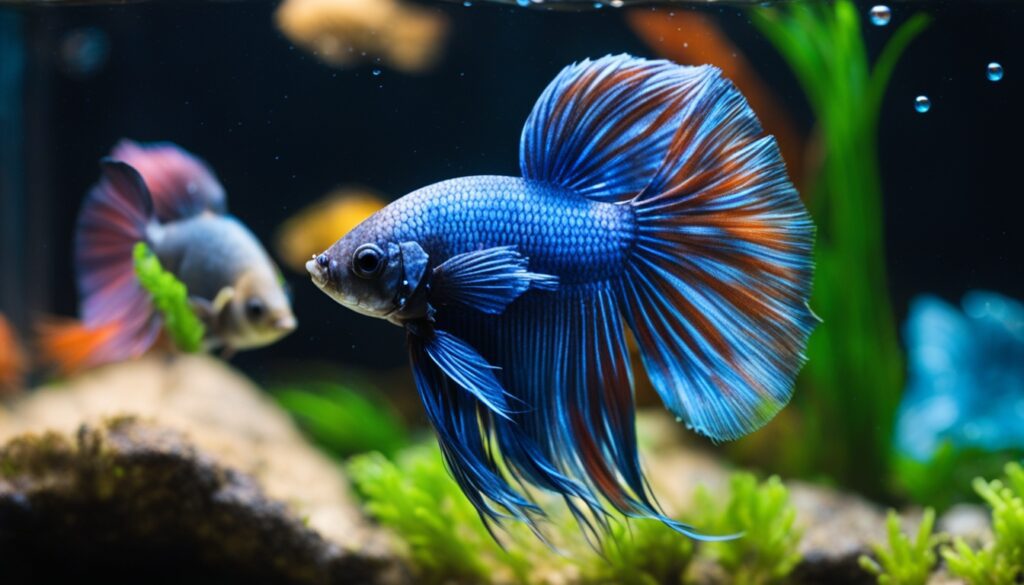
People often wonder if betta fish need darkness to sleep, and the answer is yes! It’s really important to create an environment that feels natural for their overall well-being. Betta fish do sleep, and watching them during this time can actually be pretty fascinating.
When bettas are asleep, they become less active. You’ll notice they aren’t swimming as much, but you might still see tiny movements from their mouth and gills as they breathe and conserve energy. At night, their colors often dim, which helps them blend in. This isn’t a sign of sickness—just their way of camouflaging. Once they wake up, their bright colors come right back.
What’s really interesting is that bettas have a few unique ways of sleeping. They might curl up at the bottom of the tank, float near the top, or even rest on leaves. Thanks to a special organ called a labyrinth, they can breathe from the air, so they’re free to choose whatever resting spot they like.
Do bettas need darkness to sleep? Absolutely. While they can rest with the lights on, a darker environment is much better for their sleep. It reduces stress and mimics the natural cycle of light and dark they’d experience in the wild.
To help them sleep well, it’s a good idea to set up a consistent light schedule in their tank. This routine helps signal to your betta when it’s time to be active and when it’s time to wind down. A well-rested betta is energetic and fun to watch during the day, but you’ll notice them slowing down and preparing for sleep as the light dims.
So, next time you peek into your tank at night and see your betta resting peacefully, know that they’re just recharging for another busy day in their aquatic world!
Understanding Betta Fish Sleeping Habits
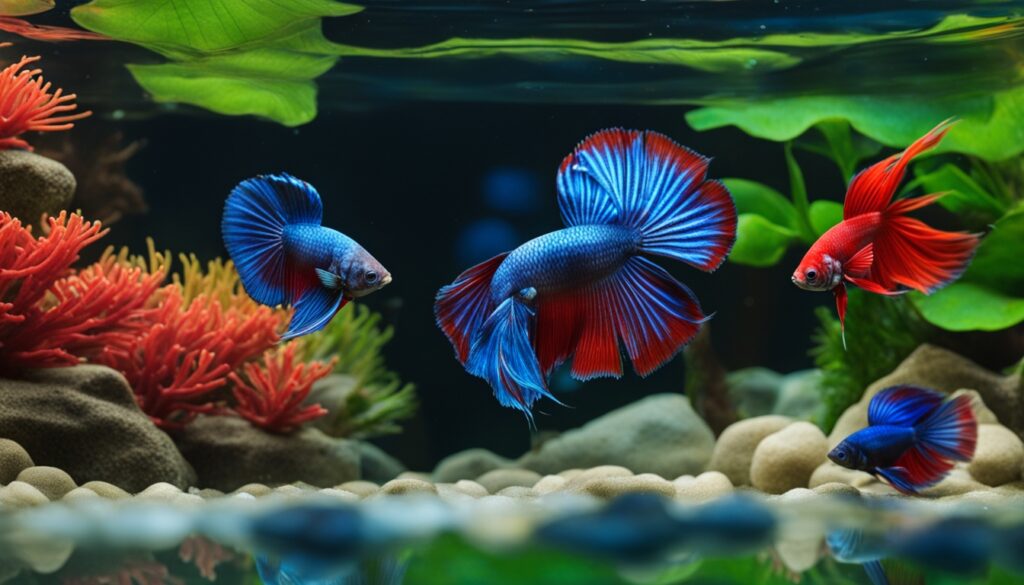
Betta fish are loved for their vibrant colors and spunky personalities, making them a go-to for aquarium enthusiasts. One of the more intriguing things about them is their sleeping habits. Bettas actually need about 12 to 14 hours of sleep daily, which is surprisingly similar to humans, though they do it in their own unique way.
How to Spot a Sleeping Betta
Since bettas don’t have eyelids, it can be tricky to tell when they’re asleep. Some key signs to watch for are lighter color and slower, more relaxed breathing. They tend to sleep in all sorts of positions—on their side, nestled in leaves, or even floating near the water’s surface. Adding things like floating plants or caves to your tank can help them feel more comfortable and improve their sleep quality.
How Bettas Sleep Differently Than Humans and Other Pets
Bettas sleep with their eyes open, which might seem odd at first. They also rest in all kinds of quirky positions that might look concerning if you’re not familiar with their behavior. Since they need to come up for air regularly, they often sleep near the surface or on cozy leaves. A good example is the popular Zoo Med Betta Bed Leaf, which gives them a comfy spot to rest.
Many betta owners, like those in the community started by Leopardfire back in 2012, talk about creating cozy sleep areas with silk leaves or aquarium-safe silicone to better mimic a betta’s natural environment. These additions help bettas follow their usual sleep patterns. There’s even some curiosity in forums about whether bettas might dream, which hints that these little fish could have more complex minds than we think!
In short, bettas have pretty fascinating sleep habits, and giving them the right setup can make all the difference in keeping them happy and well-rested.
Community Engagement |
Details |
|---|---|
Thread Views |
9,000 |
Thread Replies |
16 |
Discussion Participants |
9 |
Initiative Date |
October 26, 2012 |
Mentioned Products |
Zoo Med Betta Bed Leaf, DIY Silk Leaf Beds |
The Role of Darkness in Betta Fish Sleep Cycles
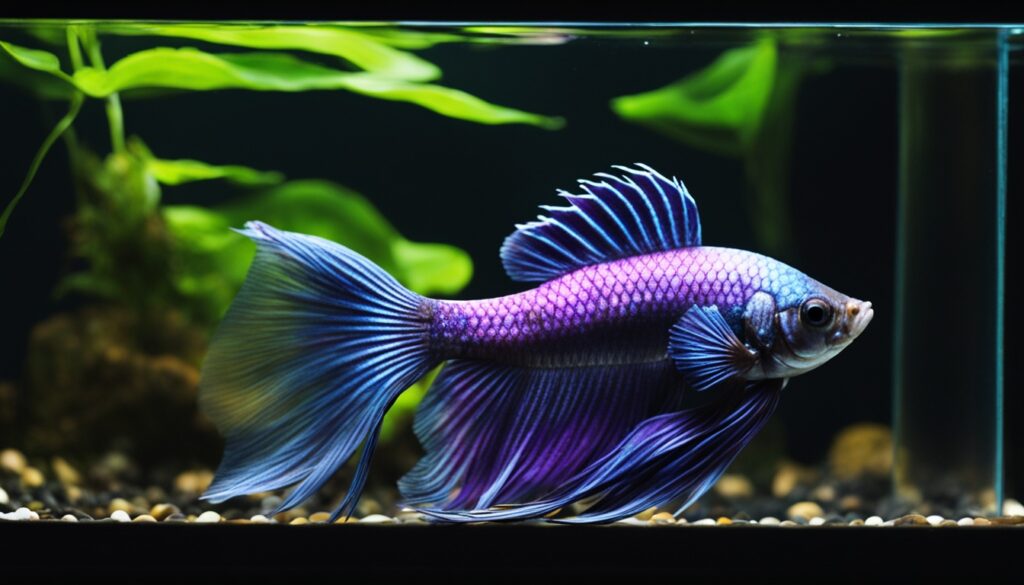
Exploring betta fish sleeping habits shows how light and dark play a role. Do bettas need darkness to sleep? Indeed, they navigate differently when it’s light or dark. Here’s a look at how light impacts their sleep.
First, bettas have small irises. This means they let in less light. So in dark or at night, they rely less on sight. Instead, bettas use their lateral line system more in the dark. This helps them survive and stay well at night.
- Bettas get stressed and less active without a light-dark cycle.
- Bright lights all the time or too much darkness can cause sadness or laziness.
- It’s key to recreate natural light to keep betta fish sleeping habits healthy.
Some betta owners share that total darkness isn’t needed, but dim or blue light is good at night. They say this doesn’t shock the bettas and keeps their sleep normal. A well-known chat by RussellTheShihTzu highlights the value of night lights that don’t upset their natural sleep.
A timer can help keep lights consistent, like the sun rising and setting. This fits well with betta fish sleeping habits. It makes them healthier and happier. So, do bettas need darkness to sleep? Not total darkness, but something close to nature’s twilight works best.
Lastly, setting up a good tank is key for bettas’ sleep. A big enough tank, decorations, and water at 76 to 82 degrees Fahrenheit are important. This way, bettas sleep well, stay healthy, and happy.
Spotting the Preferable Sleeping Spots for Bettas

Betta fish are known for finding special spots where they like to rest, and these places are often chosen based on their natural sleeping habits. Understanding their preferences gives us a glimpse into how they behave in the wild and helps us recreate that environment in our aquariums.
Why Betta Fish Love Leaves and Flat Surfaces
Bettas often rest on leaves or flat surfaces, which mimic their natural habitat in Southeast Asia. In the wild, they live in slow-moving rivers and rice paddies in Thailand and Vietnam, where flat surfaces and broad leaves provide a sense of security. In an aquarium, plants or even artificial objects can serve as perfect resting spots, helping them feel right at home.
Instincts That Guide Their Sleeping Choices
Even in a tank, bettas follow their natural instincts, seeking out safe, hidden places to sleep, like caves or behind plants. These cozy spots make them feel secure. Plus, they often pick places near the surface so they can easily come up for air, thanks to their labyrinth organ, which allows them to breathe air directly.
By understanding these natural habits, we can make our bettas happier and enjoy watching their behavior even more. It’s fascinating to see how their instincts guide them, even when they’re miles away from their wild home.
Feature |
Description |
|---|---|
Surface Sleeping |
Bettas often rest near the water surface, leveraging their labyrinth organ to breathe air directly. |
Concealed Spots |
Behind decor or plants, providing a shielded area mimicking the densely vegetated waters of their origin. |
Tank Decor |
Bettas enjoy resting on or between tank elements like hammocks fashioned explicitly for sleep. |
Behavioral Insight |
This positioning is indicative of their diurnal nature, being active during the day and resting at night. |
Health Implications |
Instances of bettas sleeping on their sides for extended periods might indicate health issues, necessitating a veterinary consultation. |
Do Betta Fish Need Lengthier Rest?
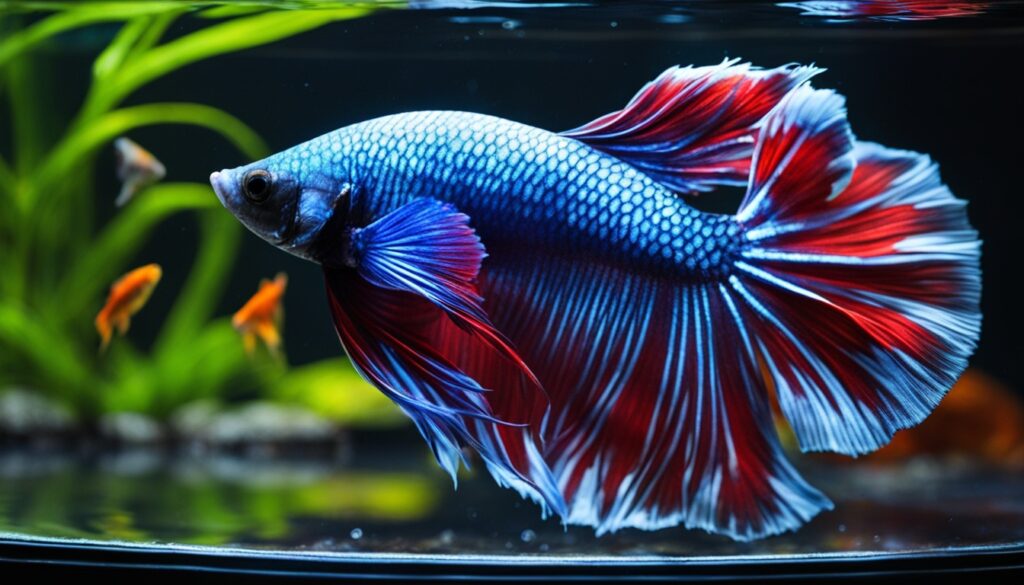
If you’re a betta fish lover, understanding their sleeping habits is key. How long do betta fish sleep? Is it more than other types of fish? These are common questions that come up for betta owners.
Let’s dive into betta sleep patterns. Healthy bettas typically sleep around 12 to 14 hours a day. Since they’re diurnal, most of their rest happens at night, but they might take naps during the day too, depending on how comfortable and safe they feel in their tank.
In my tank, bettas find all kinds of unique spots to rest. They might settle on leaf hammocks near the surface or even curl up inside logs at the bottom. These places offer them a sense of security and reflect their natural preferences for restful spots.
One fascinating thing about bettas is their ability to stay partly alert even while they’re sleeping. This lets them be aware of their surroundings and keep an eye out for potential danger, a survival instinct they still use even in the safety of an aquarium.
To help your betta get better sleep, make sure the tank is well-oxygenated and has a good filter. Creating an environment that mimics their natural habitat keeps their sleep cycle regular and healthy. Here’s a quick glimpse of where they love to rest:
Resting Preferences |
Frequency of Use |
|---|---|
Leaf Hammocks (near surface) |
High |
Decorative Logs (bottom) |
Medium |
Floating Plants (mid-water) |
Low |
This table shows how betta fish sleeping habits mix instinct and environmental comfort. Owners should watch their betta’s rest choices to tweak tank conditions for better sleep.
A good resting place helps your betta relax. It may even live longer by cutting down stress and boosting health.
The Impact of Temperature on Betta Fish Activity Levels
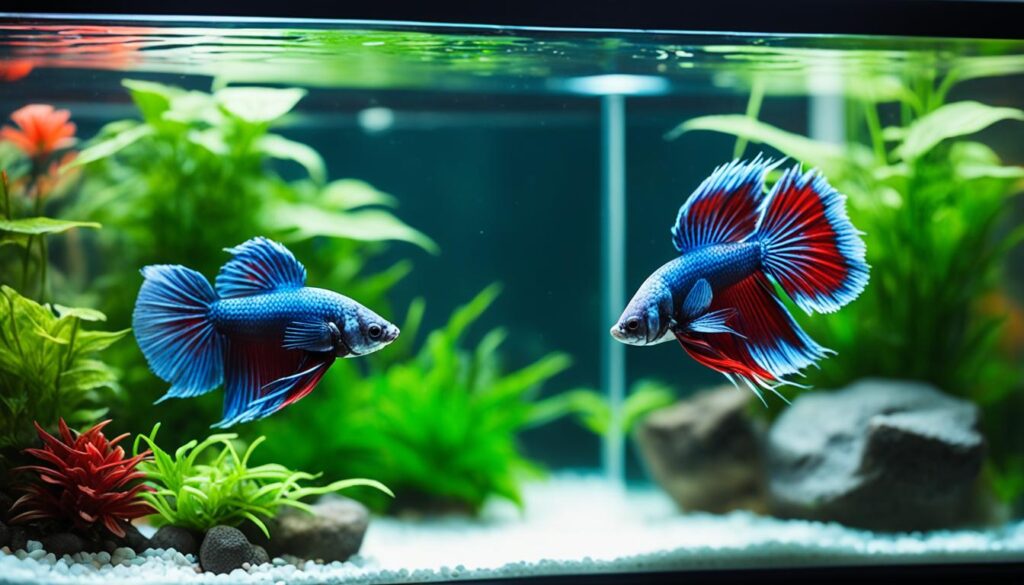
Betta fish health heavily depends on maintaining a balanced environment, and water temperature plays a big role in their overall well-being. The temperature of the water affects their metabolism, activity levels, and even sleep patterns.
Why a Warm Tank is Essential for Your Betta’s Health
Betta fish originate from warm waters in Southeast Asia, so they thrive in temperatures between 76°F and 81°F. If the water gets too cold, it slows down their metabolism, making them sluggish and prone to illness. On the flip side, keeping the water warm aids their digestion, boosts their energy, and keeps them active, all of which are critical for their feeding and swimming habits.
The Connection Between Water Temperature and Betta Metabolism
Keeping the water at the right temperature ensures your betta’s metabolism stays steady, which directly impacts their sleep patterns. Warm, stable conditions help them get uninterrupted rest, which is essential for their immune system and overall health. By observing their sleep habits, you can make sure they’re comfortable and thriving in their tank.
How Warm Water Affects Betta Activity and Sleep
When the temperature is ideal, bettas are more lively, and their metabolism runs smoothly, improving their overall quality of life. It regulates not just their energy levels during the day, but also their sleep cycles, which are important for maintaining good health. Proper tank management is key to giving your betta a long and happy life.
When to Worry: Signs of Excessive Betta Sleeping
Bettas usually follow a day-night sleep cycle, similar to humans. They often sleep in an “L” shape at the top or bottom of the tank. Without eyelids, it can be tricky to spot a sleeping betta, but you can look for signs like being unusually still or hiding in plants or caves, where they feel safe and less stressed.
However, if your betta starts sleeping more than usual, it might be cause for concern. While they do need plenty of rest, if they become overly sleepy, the water temperature might be too low. Bettas are most active in warmer water, around 78-82°F. If the water is too cool, they can become lethargic.
If you’ve checked the water temperature and their diet but they still seem too sluggish, it’s time to investigate further. Abnormal behavior like odd swimming patterns or excessive rest could be signs of health issues, such as Swim Bladder Disease.
If you notice these symptoms, consulting a vet is a smart next step. Keeping their tank clean, monitoring the water temperature, and paying attention to their behavior are crucial for their health. After all, when we bring bettas home, we take on the responsibility to care for them and ensure their well-being.
